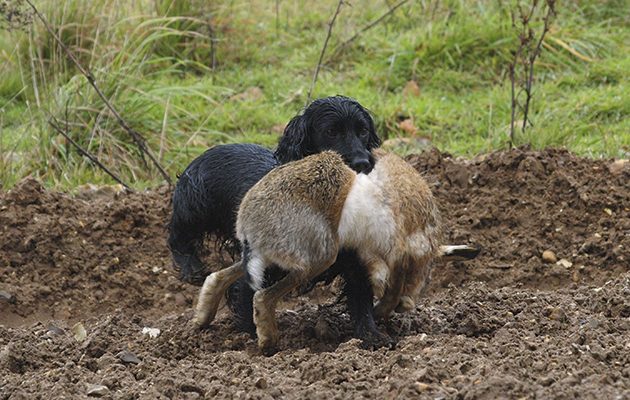… hare or goose, which, says David Tomlinson, can present a problem for entrants to the Retriever Championships – and not just because it’s hard for pickers-up to practise difficult retrieves
Even a field-trial champion can be stumped by a difficult retrieve. Only one of the problems is that they are difficult to prepare for, as David Tomlinson explains.
If you are planning on spending the off-season improving your own gundog’s retrieving, read pick up points on retrieving for our advice.
DIFFICULT RETRIEVES
To win the International Gundog League Retriever Championship, a dog has to retrieve whatever it is sent for, as long as the bird or beast is legal quarry. This is often not as simple as you might think, as I was reminded while spectating at the last championship, held at the Ampton estate in Suffolk in December. Several dogs were put out for failing to retrieve hares, which may seem surprising.
However, it’s easy to forget that hares are a specialist quarry and it can be difficult for a dog to gain experience of retrieving them. Not only are they absent from many parts of the country but most driven shoots have a strict no-ground-game policy. In many seasons of picking up in Suffolk and Norfolk, I have never been asked, or had the opportunity, to send my dogs to retrieve a hare. The only reliable way to give a dog experience of retrieving hares is to collect a road-casualty hare (sadly all too common in East Anglia) and use it for training. However, that’s not a fool-proof system, as a dog that happily retrieves a cold, stiff hare may be less keen when confronted with one that has just been shot.
At least a retriever shouldn’t have any problems in picking up and carrying a hare but that’s not true of a cocker. Some years ago, I saw a small cocker bitch put out of a trial for failing on a hare. The game little dog had found the hare and made a brave attempt to retrieve it but after 20 yards it became bogged down in soft ground and reluctantly dropped its burden. As the spaniel weighed no more than 25lb and the hare might well have tipped the scales at 14lb, the dog’s failure wasn’t surprising.
Until its elimination, the bitch had been on course to win the trial, which would have qualified it for the cocker championship. Rules are rules, so out it went for failing to complete the retrieve but you can be sure that on a shooting day its handler would have helped it.
GEESE: A SERIOUS RETRIEVING CHALLENGE
A goose is also a serious retrieving challenge and another of the difficult retrieves to prepare for. On the second morning of the championship a skein of greylags made the fatal mistake of flying low over the guns, with two falling dead between the line and the gallery, giving the spectators a rare chance to watch a retrieve at close quarters. The first dog sent completed the retrieve without difficulty but the next dog, sent for the second goose, didn’t know what to make of it. It made a good job of hunting in the beet and finding the bird but when it saw the goose it refused to pick it. After giving it a quick sniff it carried on hunting until its handler called it up.
The next dog, a stylish yellow labrador, made the retrieve look easy but I did notice that it had to stop twice on its return to adjust its grip on the goose, putting the bird down and picking it up again. I presumed that the judges didn’t mark it down for this, as a big greylag can weigh eight or nine pounds, three times the weight of a cock pheasant.
Geese have rarely featured in my sporting career but I do recall one occasion when I had a right-and-left at Canadas on a friend’s farm in Northamptonshire. A big flock of geese had been grazing the water meadows beside the River Nene and my pal was keen that we should have a shot at them. He performed a successful flushing manoeuvre with his little Suzuki 4×4 and the geese came right over me. Both geese fell on the far side of the river; my spaniel duly swam across, inspected the fallen birds, then swam back again with a look on her face that clearly said I had to be joking. My companion’s springer did the same but fortunately our host’s labrador was unfazed and did a fine job of retrieving them.
It’s quite possible to make up a field-trial champion without the dog being asked to pick up a hare or a goose, and it would have been interesting to know how many of the competing dogs in the past championship had experience of either. On the final morning of the championship I chatted with the husband of one of the leading handlers, whose dog was still in with a good chance of winning. As we talked some large flocks of greylags flew over, and he told me that his wife dreaded a goose being shot as her dog flatly refused to retrieve one. She didn’t have to worry, as no more geese were shot.
The woodcock is another bird that are difficult retrieves and can cause problems for retrieving dogs. Most dogs collect them without any trouble but others flatly refuse. I’ve never met anyone with a satisfactory explanation as to why these dogs behave in such a way but the feathers of woodcock are reputed to have a taste that some dogs dislike. Many dogs eventually overcome their initial refusal to pick woodcock but others never do. If dogs could talk we might learn why, however, this is likely to remain a mystery.





